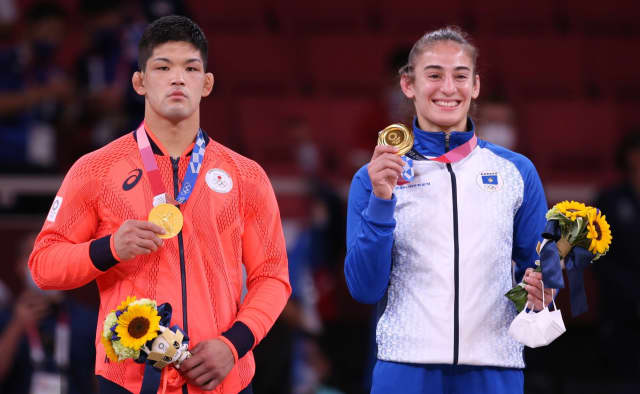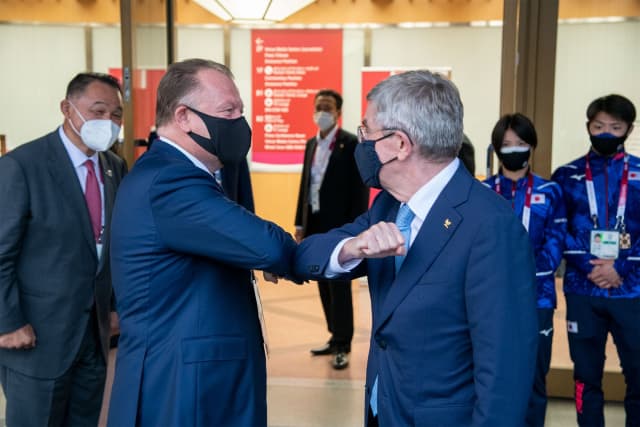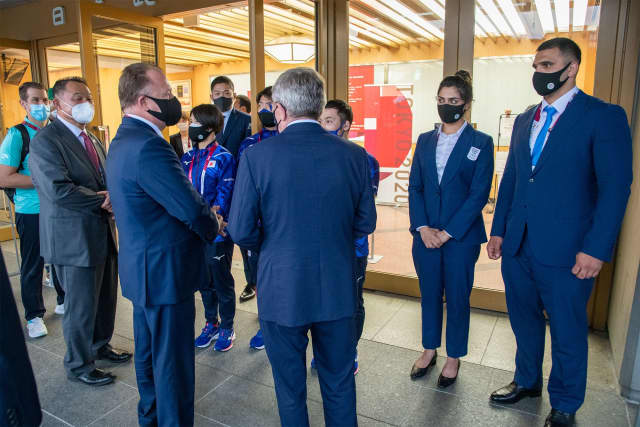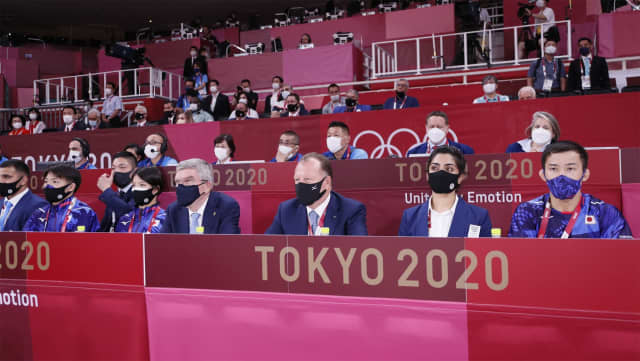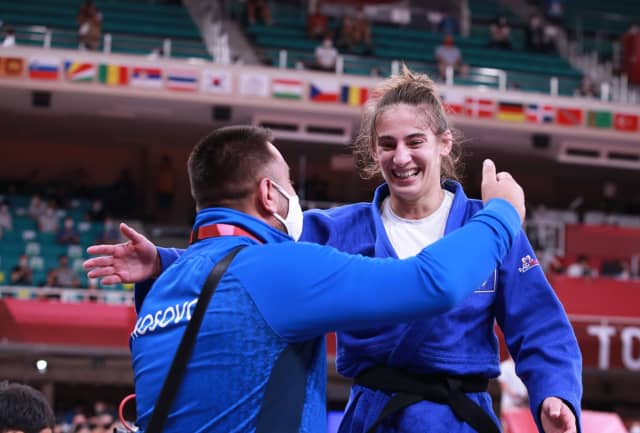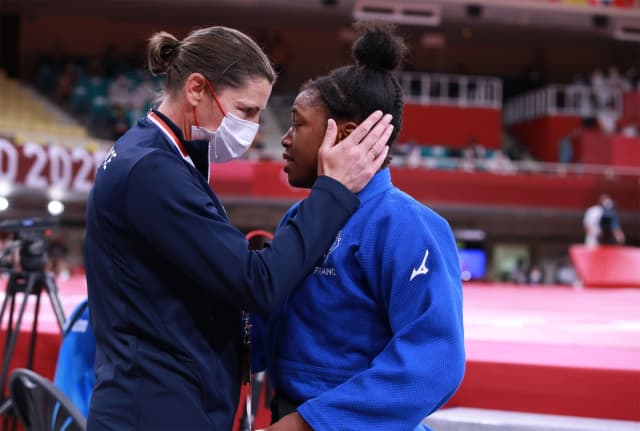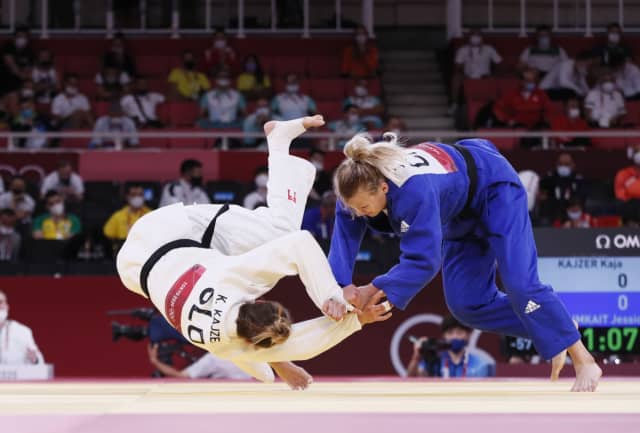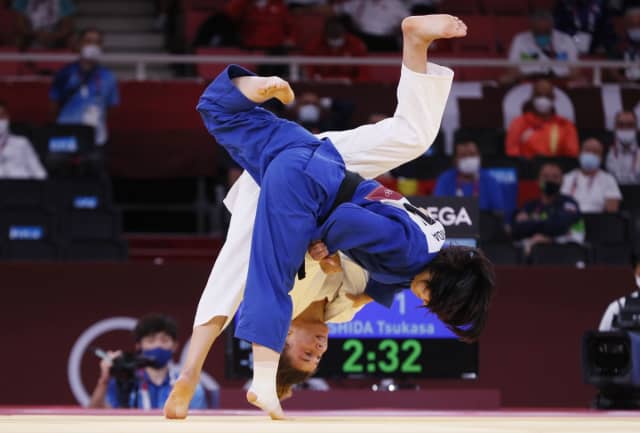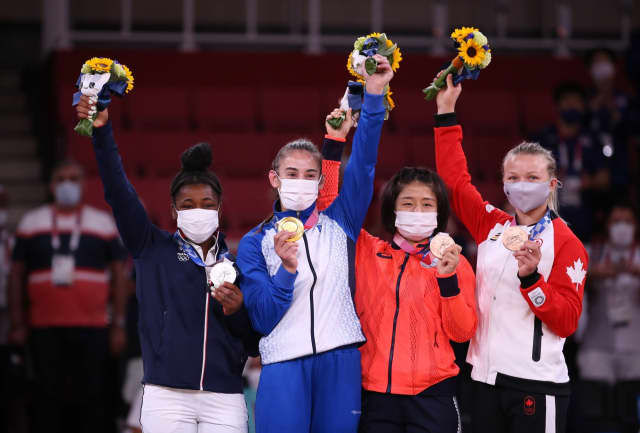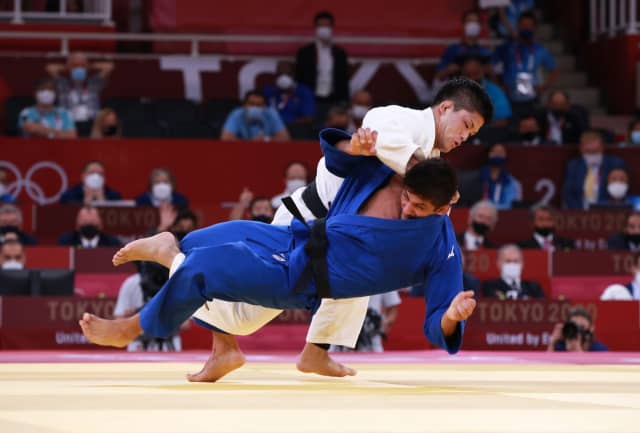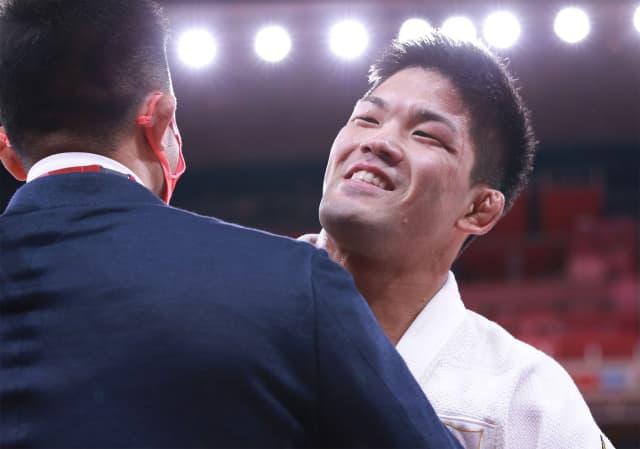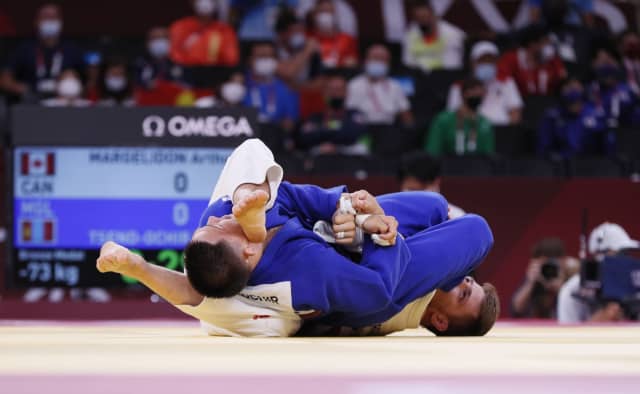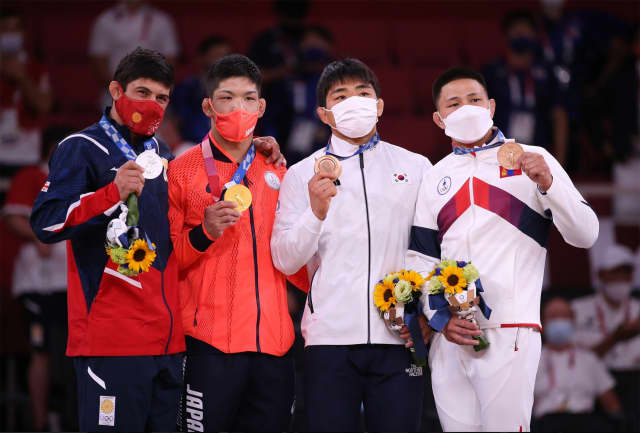Among the distinguished visitors of the day, the President of the International Olympic Committee, Mr Thomas Bach, attended the final block. He was welcomed by the President of the IJF, Mr Marius Vizer and Mr Yasuhiro Yamashita, President of the Japanese NOC and of the All Japan Judo Federation. Mr Bach was also greeted by a row of Olympic Champions, including the first three Japanese Olympic champions of this edition of the event, as well as members of the refugee team, with whom he was pleased to interact before entering the Nippon Budokan arena.
Ono is the best judo player he has ever seen. This compliment comes from another giant of the sport, Kosei Inoue himself. So it definitely means a lot and what can we say when an artist congratulates another artist? It can't be said that the victory was easy, more likely the contrary, but it can be said that no-one today was capable of reaching Ono’s level, in terms of precision, calm, control and execution.
In the women's division, a victory for the Japanese was a serious option, as well as a victory for Jessica KLIMKAIT (CAN), but all forecasts were wrong, since it is Nora GJAKOVA of Kosovo who caught the gold medal and didn't let it go, while CYSIQUE of France won the third medal for the French delegation. Tomorrow we'll have two more categories in action and they promise to be just as animated.
-57kg: GJAKOVA Signs a Second Gold Medal for Kosovo Final CYSIQUE, Sarah Leonie (FRA) vs GJAKOVA, Nora (KOS)
Two styles were in opposition as soon as the first hajime echoed in the Nippon Budokan. With her strong left handed kumi-kata, CYSIQUE seemed to impose her power quickly, despite her smaller size. Trying to put GJAKOVA off balance with her capacity to move from right to left at speed, CYSIQUE suddenly made a mistake that cost her the title. In an attempt to throw, she dived on her head, which is forbidden. The referee stopped the match and sought confirmation from the replay and supervisors. The fault was obvious and CYSIQUE was disqualified, against the course of the final, but logically when if comes to the security of the athletes.
With the disqualification CYSIQUE gets the silver medal, while GJAKOVA signs her name on a second title for Kosovo; an incredible result for the Balkan country. It’s a results that rewards the tremendous work undertaken by a small team of passionate people.
Nora GJAKOVA said, "It was not the most beautiful contest but it does not matter, the most important was to win. I want to thank Majlinda. She started the path, she supported all of us. Without her Distria's gold and my gold would have never happened."
Majlinda Kelmendi declared, "I saw all her contests today. From the first one I thought that today will be her day", while Driton Kuka the coach said, "Kuka: Kosovo is a small country but a huge judo nation."
Sarah Leonie CYSIQUE declared, "I need to see the pictures because I did not do anything wrong. I even thought she would receive shido so I was shocked when the referee pointed at me. I respect the decision but I want to see the action again."
Bronze Medal Contests LIPARTELIANI, Eteri (GEO) vs YOSHIDA, Tsukasa (JPN) KAJZER, Kaja (SLO) vs KLIMKAIT, Jessica (CAN)
Eteri LIPARTELIANI may have hoped for a better outcome after an outstanding competition day but YOSHIDA Tsukasa (JPN), who didn't reach the final, despite expectation, secured the bronze medal with two waza-ari, to add one more medal to the Japanese tally.
It took a while for Jessica KLIMKAIT (CAN) to be able to smile again after her defeat in the semi-final. The beginning of the bronze medal match was tense. She finally scored a waza-ari with her brand of seoi-nage. Let's say that it was not the expected metal for the Canadian, but this is still a strong performance for her first participation in the Games. It’s also a first women’s Olympic medal in judo for Canada and that too is a record worth logging.
Jessica KLIMKAIT said, "I wont say I’m tired since Budapest. That was six weeks ago. No excuses. Everything was set here and I was ready to win. I don’t know what happened."
Semi-finals KLIMKAIT, Jessica (CAN) vs CYSIQUE, Sarah Leonie (FRA) YOSHIDA, Tsukasa (JPN) vs GJAKOVA, Nora (KOS)
In this category you had to be among the favourites to hope to enter the last four, since it was the four top seeds who ended up in the semi-finals.
In the top half of the draw, world number one and recent world champion, Jessica KLIMKAIT (CAN), confirmed her good physical and mental condition of Budapest a month ago, after having defeated, without any problem, Ivelina ILIEVA (BUL) and Julia KOWALCZYK (POL) during the first two rounds.
The journey was a little bit more difficult for the French fighter Sarah Leonie CYSIQUE, who had to come through strong battles, especially against Eteri LIPARTELIANI in the quarter-final, who was the first to score a waza-ari before CYSIQUE then scored twice. Limping at the end of the match, the French judoka certainly enjoyed the break to recover for what was one of the most important matches of her career. It is guaranteed that on her side Jessica KLIMKAIT wanted to prove that the choice made by Judo Canada to bring her to Tokyo instead of Crista DEGUCHI was the right one.
We witnessed a very interesting semi-final from a tactical point of view. It was not spectacular but for judo lovers they must have enjoyed it. KLIMKAIT had her tactical plan in mind and she was sticking to it: moving in large circles and launching her low seoi-nage, even if it is often at the limit of the false attack rule. On the other side, the French fighter had to stay strictly left-handed and go over the Canadian when the latter was on her knees, to either go for the uchi-mata or the counter attack in the other direction. Neither one of them could throw during normal or extra time, but penalties were given. First two to KLIMKAIT, for false attacks and then to CYSIQUE for passivity, which was relative, seeing the pace of the match. The third penalty went ultimately to KLIMKAIT for another false attack that cost her the ticket to the final and offered a second final in a row for team France after the performance of BUCHARD on day 2.
In the second half of the draw the semi-final brought together Tsukasa YOSHIDA (JPN), who discretely passed all the preliminary rounds without too much noise, with Nora GJAKOVA (KOS), super-motivated by the performance of Distria Krasniqi on day one of the Olympic tournament. She went through the first matches with ease and power.
As the semi-final started it looked like GJAKOVA might have issues with the perfect left uchi-mata of the Japanese, who made the Kosovan take-off from the tatami several times, but GJAKOVA was still there in the golden score period and when she launched a ko-soto-gake from nowhere, she threw YOSHIDA for a waza-ari and the stadium suddenly became quiet. Yes, for the second time in three days, Kosovo put an athlete in the final. Kelmendi can be proud of her heritage.
Repechage KOWALCZYK, Julia (POL) vs LIPARTELIANI, Eteri (GEO) NELSON LEVY, Timna (ISR) vs KAJZER, Kaja (SLO)
Julia KOWALCZYK (POL) was the executioner of several veterans of the category today, who probably participated in their last Olympic Games. After Tokyo 2020, some athletes will stop competing at the highest level, while a new generation of competitors will show their faces. It's difficult to mention all the athletes who proved to be among the top players of the incumbent generation, who will stop for sure after Tokyo. Let's mention Telma Monteiro (POR), Hedvig KARAKAS (HUN) and Miryam ROPER (PAN), who might have walked on the Olympic tatami for the last time. The most emblematic one of this moment is Sabrina Filzmoser (AUT).
Sabrina’s final moment was very moving and the delegations and officials present were not mistaken when Sabrina left the tatami of the Nippon Budokan to the ovation of the public; an ovation worthy of the incredible career of this champion. She participated for the first time in the Olympic Games in 2008 in Beijing, was world number one for a while, won two European titles and two world bronze medals. Today Sabrina leaves the high level tatami as an IJF Climate Ambassador and she was recently elected by her peers as Chair of the IJF Athletes' Commission. We will continue to see her in the judo world, in a different position. She can be thanked for all she brought to judo and all she is still willing to share with our judo family. That moment when Sabrina left the mat was very special, for a very special person. Hats off, champion!
Thus the Polish KOWALCZYK was still present in the repechage after she was defeated by KLIMKAIT. She faced Eteri LIPARTELIANI (GEO). It took more that 7 minutes (4+3) to LIPARTELIANI to score a waza-ari to keep her olympic medal dream alive.
Timna NELSON LEVY had several tough bouts during the morning session but she managed to get to the repechage hoping for a new chance of a medal for team Israel, after the fifth place of RISHONY on day one of the Games. She was up against to Kaja KAJZER of Slovenia to access the bronze medal contests. With two shido on her name, the Slovenian was in a bod position on the golden score, when NELSON LEVY made a mistake and was thrown for waza-ari, destroying her last hope to get onto the podium.
Final Results 1 GJAKOVA Nora (KOS) 2 CYSIQUE Sarah Leonie (FRA) 3 YOSHIDA Tsukasa (JPN) 3 KLIMKAIT Jessica (CAN) 5 LIPARTELIANI Eteri (GEO) 5 KAJZER Kaja (SLO) 7 KOWALCZYK Julia (POL) 7 NELSON LEVY Timna (ISR)
-73kg: ONO, the Artist Final ONO, Shohei (JPN) vs SHAVDATUASHVILI, Lasha (GEO)
His 13th position in the World Ranking List is far away from showing the talent of ONO, who participates in only a few events but when he does, he does it well and secures gold medals with a kind of ease. In the final he was faced with Lasha SHAVDATUASHVILI (GEO), who has one of the most impressive prize lists on the circuit. Olympic champion eight years ago in London and then a bronze medallist in 2016 in Rio, one weight up, the Georgian once again managed to fight his way into the final of the Olympic Games.
It is quite difficult to describe what happened during the final match of the day. On one side, we had the incarnated calmness of the Japanese champion, stable like a rock, who seems to be always in control of his emotions and on the other side we had an incredible warrior who was not here to play cards but to win against the best judoka of the moment. We would have loved to watch them for hours, getting more and more exhausted but still standing because neither is capable of giving up their spot on centre court. It seemed that it was not just winning the title that was important to these men but to engage in the most pure of judo battles and to win well.
ONO seemed impossible to throw and SHAVDATUASHVILI was like a cat with several lives, until that moment when ONO did what he does best, producing a piece of art. That sasae-tsuri-komi-ashi exploded from nowhere, like a single brushstroke of black ink on the paper to draw a perfect Japanese character. Ono is a giant, but he is a giant because he had another giant of the sport in front of him. The victory awarded, ONO and SHAVDATUASHVILI showed a profound respect to one another and then left the mat. Only then did a smile appear on Ono's face. He did it! He is Olympic champion for the second time and nothing seems to be able to stop him. We await more painting from the artist in the future.
Ono Shohei said: "When I won my first Olympic title I was young. Today, and after years of defeating everyone, I can tell you that it wasn't easy. I'm also very happy because during all these years I managed to stay in my weight category, and this is also an achievement."
Kosei Inoue said,:"Ono is the best judoka I’ve ever seen in my life. He is the perfect combination of power, precision and technique."
Lasha Shavdatuashvili said: "I am a little disappointed of course but Ono is the best judoka. He’s so strong and he never makes mistakes. In the end this is judo and we are equal, each with two hands and two legs and the same opportunities. The best wins. My road to the final was hard but I always trust myself and I will never give up."
Bronze Medal Contests ORUJOV, Rustam (AZE) vs AN, Changrim (KOR) MARGELIDON, Arthur (CAN) vs TSEND-OCHIR, Tsogtbaatar (MGL)
He was one of the favourites for a medal in the morning. Actually, both Rustam ORUJOV (AZE) and AN Changrim (KOR) were favourites but one had to bow out and it was ORUJOV; a silver medal five years ago but defeated here by the Korean with a seoi-nage just a few seconds before the final gong. AN Changrim adds one more medal to the tally for Korea, on the occasion of the Tokyo 2020 Olympic Games.
The second bronze medal contest could go either way between Arthur MARGELIDON (CAN) and Tsogtbaatar TSEND-OCHIR (MGL), as both athletes demonstrated great skills and capacities to throw during the first rounds. It was TSEND-OCHIR who proved to be most concentrated when he immediately followed to the ground after a confused action, with an armlock for ippon and the second bronze medal for Mongolia.
Semifinals ONO, Shohei (JPN) vs TSEND-OCHIR, Tsogtbaatar (MGL) SHAVDATUASHVILI, Lasha (GEO) vs AN, Changrim (KOR)
Sometimes when things are too well known in advance and when everything is already written, it becomes kind of uninteresting but this is not the case with Shohei ONO (JPN). The Japanese Rio Olympic champion was the first judoka to step on the tatami on the morning of the competition, when the venue was still totally silent. Eyes closed, walking slowly to feel the mat, ONO was ready and he proved to be just that during the first matches.
Thus it is never uninteresting to watch an artist perform. ONO can be considered the Michelangelo of judo or the Leonardo da Vinci, especially when you see what he is capable of doing in front of ORUJOV (AZE), who really tried to push the Japanese to the limit, but nobody knows where those limits are. Within a few seconds, ONO had thrown ORUJOV twice, each time with impressive technique.
In the semi-final ONO faced Tsogtbaatar TSEND-OCHIR for a spot in the final. For the majority of normal time it was a very even contest and that gave rise to increasing anticipation in the arena. When will he throw? What technique will he choose? Actually it wasn’t that simple as the Mongolian had prepared expertly and cancelled most efforts from Ono.
The second semi-final saw the new world champion from Budapest, Lasha SHAVDATUASHVILI (GEO), facing AN Changrim (KOR), who had really tough matches, including a first round against the 2016 Olympic champion at -66kg, Fabio BASILE, and others against Khikmatillokh TURAEV (UZB) and Tohar BUTBUL (ISR) but in every case the Korean found the necessary resources to score a liberating waza-ari.
Cagey gripping took up the majority of the first 2 and a half minutes and eventually both were penalised. It’s not surprising though, with both men aware of the caliber of the opponent. With a few seconds of the fight left, both judoka opened up, looking to avoid the pressure of golden score. 45 seconds into extra time, Shavdatuashvili put in his strongest attack of the contests, with a kata-guruma but An was ready for it and defended perfectly.
In the next exchange he continued to raise the level of power imposed, attacking first and from a dominant grip. Then a low left seoi-nage and then a sacrifice. Lasha did all he could to out-work the Korean and it paid off, putting Shavadtuashvili into the second Olympic final of his career and only a month after becoming world champion for the first time.
Repechage ORUJOV, Rustam (AZE) vs GJAKOVA, Akil (KOS) MARGELIDON, Arthur (CAN) vs BUTBUL, Tohar (ISR)
Rustam ORUJOV thought this would be his day and that he would be able to defeat the king ONO, but this was not the case. Should the Azerbaijani have something to complain about? Probably just that ONO is on another planet and that's all. In the repechage ORUJOV met Akil GJAKOVA (KOS) who proved that not only the women are performing in Kosovo. Once again the match was a tough one and the athletes couldn't decide the winner within normal time and had to employ the golden score period, where ORUJOV finally scored a waza-ari to have one more chance to win an Olympic medal after his Rio second place five years ago.
At the beginning of the day, Mike TAMURA, President of Judo Canada and IJF EC member told us, "It might be a good day for Canada.” With both Canadian athletes in the final block, he was right. The question was the colour of the medals, if any. For Arthur MARGELIDON (CAN) it could still be a bronze medal but before that he had to face Tohar BUTBUL (ISR). With two waza-ari MARGELIDON secured a place in the bronze medal match.
Final Results 1 ONO Shohei (JPN) 2 SHAVDATUASHVILI Lasha (GEO) 3 TSEND-OCHIR Tsogtbaatar (MGL) 3 AN Changrim (KOR) 5 ORUJOV Rustam (AZE) 5 MARGELIDON Arthur (CAN) 7 BUTBUL Tohar (ISR) 7 GJAKOVA Akil (KOS)

